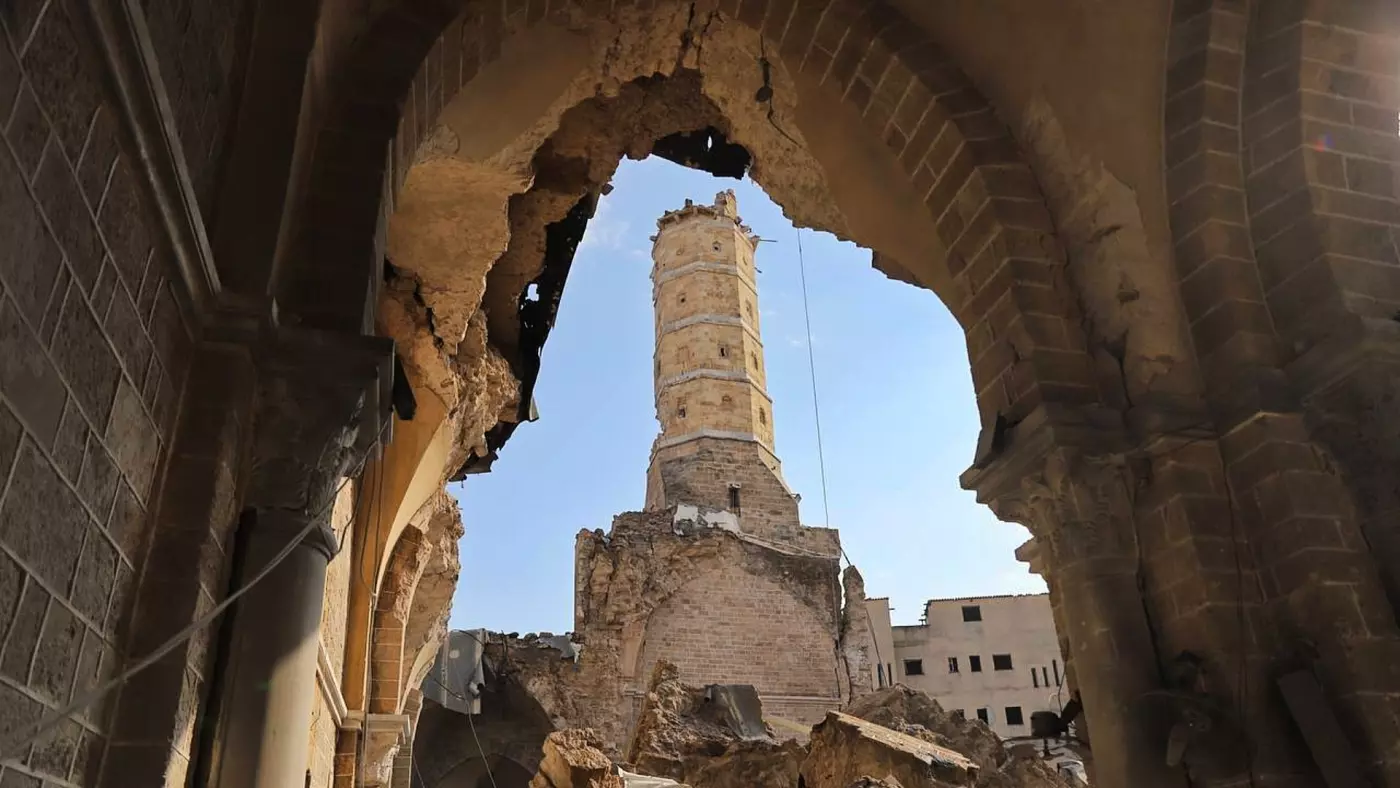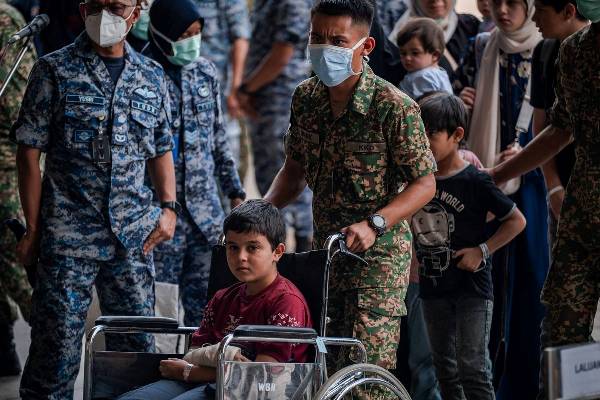At night you lie in the dark on the cold cement floor. The phones are cut. The internet is off. You do not know what is happening. There are flashes of light. There are waves of blast concussions. There are screams. It does not stop.
‘Children of Gaza’ — Mr. Fish
By Chris Hedges
Original to ScheerPost

Dear child. It is past midnight. I am flying at hundreds of miles an hour in the darkness, thousands of feet over the Atlantic Ocean. I am traveling to Egypt. I will go to the border of Gaza at Rafah. I go because of you.
You have never been in a plane. You have never left Gaza. You know only the densely packed streets and alleys. The concrete hovels. You know only the security barriers and fences patrolled by soldiers that surround Gaza. Planes, for you, are terrifying. Fighter jets. Attack helicopters. Drones. They circle above you. They drop missiles and bombs. Deafening explosions. The ground shakes. Buildings fall. The dead. The screams. The muffled calls for help from beneath the rubble. It does not stop.
Night and day. Trapped under the piles of smashed concrete. Your playmates. Your schoolmates. Your neighbors. Gone in seconds. You see the chalky faces and limp bodies when they are dug out. I am a reporter. It is my job to see this. You are a child. You should never see this.
The stench of death. Rotting corpses under broken concrete. You hold your breath. You cover your mouth with cloth. You walk faster. Your neighborhood has become a graveyard. All that was familiar is gone. You stare in amazement. You wonder where you are.
You are afraid. Explosion after explosion. You cry. You cling to your mother or father. You cover your ears. You see the white light of the missile and wait for the blast. Why do they kill children? What did you do? Why can’t anyone protect you? Will you be wounded? Will you lose a leg or an arm? Will you go blind or be in a wheelchair? Why were you born? Was it for something good? Or was it for this?
Will you grow up? Will you be happy? What will it be like without your friends? Who will die next? Your mother? Your father? Your brothers and sisters? Someone you know will be injured. Soon. Someone you know will die. Soon.
At night you lie in the dark on the cold cement floor. The phones are cut. The internet is off. You do not know what is happening. There are flashes of light. There are waves of blast concussions. There are screams. It does not stop.
When your father or mother hunts for food or water you wait. That terrible feeling in your stomach. Will they come back? Will you see them again? Will your tiny home be next? Will the bombs find you? Are these your last moments on Earth?
You drink salty, dirty water. It makes you very sick. Your stomach hurts. You are hungry. The bakeries are destroyed. There is no bread. You eat one meal a day. Pasta. A cucumber. Soon this will seem like a feast.
You do not play with your soccer ball made of rags. You do not fly your kite made from old newspapers.
You have seen foreign reporters. We wear flak jackets with the word PRESS written on it. We have helmets. We have cameras. We drive jeeps. We appear after a bombing or a shooting. We sit over coffee for a long time and talk to the adults. Then we disappear. We do not usually interview children. But I have done interviews when groups of you crowded around us. Laughing. Pointing. Asking us to take your picture.
I have been bombed by jets in Gaza. I have been bombed in other wars, wars that happened before you were born. I too was very, very scared. I still have dreams about it. When I see the pictures of Gaza these wars return to me with the force of thunder and lightning. I think of you.
All of us who have been to war hate war most of all because of what it does to children.
I tried to tell your story. I tried to tell the world that when you are cruel to people, week after week, month after month, year after year, decade after decade, when you deny people freedom and dignity, when you humiliate and trap them in an open-air prison, when you kill them as if they were beasts, they become very angry. They do to others what was done to them. I told it over and over. I told it for seven years. Few listened. And now this.
There are very brave Palestinian journalists. Thirty-nine of them have been killed since this bombing began. They are heroes. So are the doctors and nurses in your hospitals. So are the U.N. workers. Eighty-nine of whom have died. So are the ambulance drivers and the medics. So are the rescue parties that lift up the slabs of concrete with their hands. So are the mothers and fathers who shield you from the bombs.
But we are not there. Not this time. We cannot get in. We are locked out.
Reporters from all over the world are going to the border crossing at Rafah. We are going because we cannot watch this slaughter and do nothing. We are going because hundreds of people are dying a day, including 160 children. We are going because this genocide must stop. We are going because we have children. Like you. Precious. Innocent. Loved. We are going because we want you to live.
I hope one day we will meet. You will be an adult. I will be an old man, although to you I am already very old. In my dream for you I will find you free and safe and happy. No one will be trying to kill you. You will fly in airplanes filled with people, not bombs. You will not be trapped in a concentration camp. You will see the world. You will grow up and have children. You will become old. You will remember this suffering, but you will know it means you must help others who suffer. This is my hope. My prayer.
We have failed you. This is the awful guilt we carry. We tried. But we did not try hard enough. We will go to Rafah. Many of us. Reporters. We will stand outside the border with Gaza in protest. We will write and film. This is what we do. It is not much. But it is something. We will tell your story again.
Maybe it will be enough to earn the right to ask for your forgiveness.
Chris Hedges is a Pulitzer Prize–winning journalist who was a foreign correspondent for 15 years for The New York Times, where he served as the Middle East bureau chief and Balkan bureau chief for the paper. He previously worked overseas for The Dallas Morning News, The Christian Science Monitor and NPR. He is host of the show The Chris Hedges Report.
Author’s Note to Readers: There is now no way left for me to continue to write a weekly column for ScheerPost and produce my weekly television show without your help. The walls are closing in, with startling rapidity, on independent journalism, with the elites, including the Democratic Party elites, clamoring for more and more censorship. Bob Scheer, who runs ScheerPost on a shoestring budget, and I will not waiver in our commitment to independent and honest journalism, and we will never put ScheerPost behind a paywall, charge a subscription for it, sell your data or accept advertising. Please, if you can, sign up at chrishedges.substack.com so I can continue to post my Monday column on ScheerPost and produce my weekly television show, “The Chris Hedges Report.”
This column is from Scheerpost, for which Chris Hedges writes a regular column. Click here to sign up for email alerts.
Post Disclaimer | Support Us
Support Us
The sailanmuslim.com web site entirely supported by individual donors and well wishers. If you regularly visit this site and wish to show your appreciation, or if you wish to see further development of sailanmuslim.com, please donate us
IMPORTANT : All content hosted on sailanmuslim.com is solely for non-commercial purposes and with the permission of original copyright holders. Any other use of the hosted content, such as for financial gain, requires express approval from the copyright owners.
 Sri lanka Muslims Web Portal Sri Lanka Muslims News Center
Sri lanka Muslims Web Portal Sri Lanka Muslims News Center
 Donate
Donate


